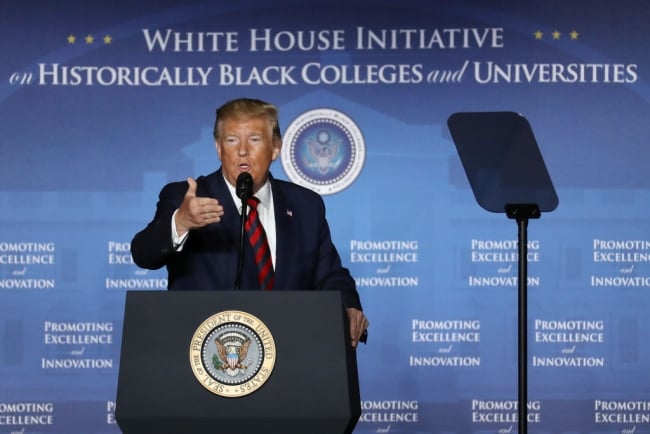You have /5 articles left.
Sign up for a free account or log in.

Donald Trump addressed HBCU leaders at the National Historically Black Colleges and Universities Week Conference in 2019.
Chip Somodevilla/Staff/Getty Images
During the presidential debate in late June, Donald Trump emphasized policies he described as appealing to Black voters—and, as usual, highlighted in particular investments during his presidency in historically Black colleges and universities.
The former president said of HBCUs that he “got them all funded,” prompting President Joe Biden to later fire back that his administration delivered billions of dollars to these institutions because “any Black student is capable … [of] doing what any white student can do.”
Biden “has lost much of the Black population because he has done a horrible job for Black people,” Trump said.
It wasn’t the first time the former president and now Republican nominee has made bold claims about his support for HBCUs. Trump famously said at the Davos economic conference in 2020 that he “saved” HBCUs. At the National HBCU Week Conference the previous year, he told campus leaders that his commitment to their institutions was “bigger and better and stronger than any previous administration by far.”
Biden has also frequently touted his “record” support for HBCUs on the campaign trail—most recently in a speech to the NAACP National Convention in Nevada this Tuesday.
While Black voters still overwhelmingly support Biden, that support could be slipping, according to recent polls. A poll from The New York Times and Siena College earlier in July found that 73 percent of Black respondents reported they’d vote for Biden if the election was held that day. That’s significantly lower than the 92 percent of Black voters who turned out for Biden in 2020, according to a Pew Research Center report. A June poll from the Associated Press and NORC at the University of Chicago, a nonpartisan research center, found that younger Black voters hold more favorable views of Trump than their older counterparts. About a third of Black adults under age 45 view him positively, compared to a 10th of older Black adults.
This week’s Republican National Convention, though low on talk of HBCUs, featured some prime-time appeals to Black voters, including remarks by model Amber Rose on Monday night. Rose briefly attended Alabama State University, an HBCU in Montgomery, last year as part of a BET+ reality TV show called College Hill: Celebrity Edition that sent a group of celebrities to the campus.
“I believed the left-wing propaganda that Donald Trump was a racist,” Rose told the crowd. “I realized Donald Trump and his supporters don’t care if you’re Black, white, gay or straight—it’s all love.”
Lodriguez Murray, senior vice president of public policy and government affairs at the United Negro College Fund, an organization representing private HBCUs, welcomes Trump and Biden’s back-and-forth claims. A decade ago, he said, presidents and presidential candidates likely wouldn’t have talked about HBCUs at all.
“It sends a signal of how important the votes of African Americans are,” he said, “and it sends a signal of how important the economic viability of African American populations truly is.”
But did Trump really get HBCUs “all funded”? Was his presidency actually “bigger and better” for them than his predecessors’? HBCU leaders and experts say the answer is yes and no. Their institutions did make meaningful gains under Trump, they say. But some argue he’s exaggerated his role in those efforts and worry that a second Trump administration could pose fresh challenges for HBCUs.
The First-Term Record
HBCUs had some notable wins during Trump’s presidency.
The most often cited is the FUTURE Act, which Trump signed into law in 2019, making permanent an additional $255 million in annual funding for minority-serving institutions, including $85 million a year for HBCUs. The legislation, advanced by a bipartisan group of lawmakers in Congress, was widely celebrated at the time by leaders of the chronically underfunded institutions. In 2020, Trump also signed the HBCU PARTNERS Act, which required certain federal agencies to submit annual plans documenting how they’d make their grant programs more accessible to HBCUs.
Trump also moved the White House Initiative on HBCUs out from under the auspices of the Education Department to the White House, which was read as a symbolic gesture that HBCUs would be a priority. HBCU advocates also applauded policy moves like the restoration of year-round Pell Grants under Trump in 2017, which enabled students to use federal financial aid for summer courses.
Federal COVID-19 relief dollars doled out to HBCUs under Trump were especially “consequential in keeping them operating,” said David Sheppard, chief business and legal officer at the Thurgood Marshall College Fund, an organization representing public HBCUs. But he emphasized that HBCU advocates worked with Congress to get many of these pieces of legislation passed, including the FUTURE Act—and said that while Trump didn’t oppose those efforts, he didn’t spearhead them, either.
“The Trump administration can be fairly credited with working with us in some ways … to provide certain funding for our schools, and we were able to accomplish some things,” Sheppard said. But the implication that the Trump administration initiated these policies is “where the exaggeration probably rears its head the most.”
“Comparatively, more progress was made” to further HBCUs’ interests “under the Biden administration than the Trump administration,” he added.
Murray said that Trump’s budget proposals as president generally called for level funding for HBCUs, nothing “earth-shattering.” Rather, HBCUs made funding gains because members of Congress pushed for those increases in final budgets.
But Murray credits Trump with raising the profile of HBCUs by repeatedly talking about them from the bully pulpit. During his presidency, Trump brought up HBCUs “as a constant refrain,” Murray said—even in unlikely places, like states without HBCUs. He maintains that “no president, no matter what their race was, had done that before.”
Murray believes Biden “used the learnings of the Trump administration” to take HBCU advocacy a step farther.
“President Biden took where President Trump left off, and then he continued to walk up a staircase to elevate the institutions,” Murray said, noting that both Biden and his vice president, Howard University alumna Kamala Harris, made commencement speeches at HBCU graduations this spring. “No other president had put HBCU increases in his budget like President Biden has done, period, point-blank.”
The Biden administration said in May that it had committed a total of roughly $16 billion to HBCUs from fiscal year 2021 to 2024, an investment the president referenced—though he misstated the amount—at the June debate and again in Nevada. That sum includes federal grants, contracting opportunities, debt relief, aid to students and COVID-19 relief funds.
“They don’t have the money for the laboratories, don’t have the money for all that material,” Biden said at the NAACP convention. “So, that’s why I’ve invested a record $16 billion in HBCUs, because no HBCU student is any less qualified than any student anywhere else.”
But HBCU leaders have told Inside Higher Ed that Biden’s term has also come with disappointments. For example, one of Biden’s 2020 campaign policy proposals would have mandated that universities with endowments of more than $1 billion use a portion of federal research dollars to subcontract with HBCUs or other minority-serving institutions. But the legislation never materialized. The botched rollout of the new Free Application for Federal Student Aid this year also frustrated many HBCU students and their advocates.
Biden also proposed major investments in HBCUs in the Build Back Better plan that ultimately didn’t make it through Congress. Like Trump, his first-term legacy on HBCUs has ultimately been mixed.
Walter Kimbrough, interim president of Talladega College, an HBCU in Alabama, joined others in noting that HBCU funding has been one of Trump’s core talking points with Black voters, which makes sense given that HBCUs tend to “regularly enjoy bipartisan support.”
But some of the former president’s boasts about his efforts on behalf of HBCUs left Kimbrough perplexed when Trump was in office. Trump, for example, took credit in 2019 for lifting restrictions on federal funds for faith-based HBCUs for capital improvement projects. Yet Kimbrough—the former president of two religiously affiliated HBCUs, Dillard University and Philander Smith College—said he never had problems accessing these funds for infrastructure projects.
“That has never been an issue,” he said. “I don’t know if it was a PR ploy, I have no idea. It didn’t make sense to me.”
Kimbrough added that even though Trump reauthorized funding for HBCUs through the FUTURE Act, he also proposed cuts to federal programs critical for HBCU students. For example, Trump suggested funding cuts to Federal Work-Study and the Supplemental Education Opportunity Grant and opposed increases to the maximum Pell Grant in his budget proposals. At least 75 percent of HBCU students rely on Pell Grants to pay for college, according to data shared by TMCF. Congress averted the proposed cuts to higher ed spending.
Still, programs “very important to HBCUs were always under threat,” Kimbrough said.
Ravi Perry, a political science professor at Howard University, said that while Trump made “symbolic overtures” to HBCUs while president, his vitriol toward critical race theory and diversity, equity and inclusion efforts showed a lack of support for their mission. Perry noted that when Trump spoke at Benedict College in South Carolina in 2019—Trump’s only visit to an HBCU, as far as Perry can recall—students were told to stay in their dorm rooms because of concerns about protests.
“Any of his rhetoric that’s anti-DEI, any of his rhetoric that’s anti-CRT, all of that is anti-HBCU,” Perry said.
Hopes and Worries
Sheppard hopes HBCUs would score some legislative wins in a second Trump term, just as they did during the first. But he also worries that Trump could try to make cuts to Pell and other programs that benefit HBCU students, which “would be devastating for both our students and our schools.”
He’s also concerned that work undertaken by the Biden administration to address HBCU underfunding could be discontinued under Trump, especially if the Republican nominee makes good on his promise to disband the Department of Education.
Education Secretary Miguel Cardona and Agriculture Secretary Tom Vilsack sent letters to 16 state governors last year detailing the extent to which each state had historically underfunded historically Black land-grant universities. Sheppard said he doesn’t know who’s going to continue applying pressure on state leaders to cough up what HBCUs are owed if the Department of Education ceases to exist. He hopes that won’t happen, he said.
Perry also believes HBCUs aren’t immune from the negative attitudes toward higher ed coming out of the Republican Party right now. He noted that Trump’s pick for vice president, Republican Ohio senator J.D. Vance, has in the past referred to professors and universities writ large as “the enemy.”
“For higher ed, it will be a disaster” if Trump wins in November, Perry predicted. And because HBCUs are already underresourced and stretched thin, he said, “wherever there is a cold in higher ed, there’s a flu in HBCUs.”





